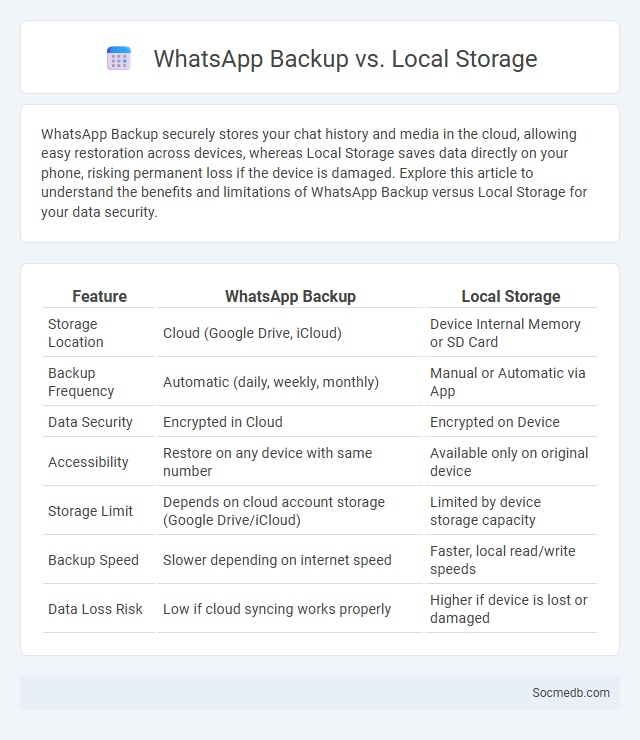
Photo illustration: WhatsApp Backup vs Local Storage
WhatsApp Backup securely stores your chat history and media in the cloud, allowing easy restoration across devices, whereas Local Storage saves data directly on your phone, risking permanent loss if the device is damaged. Explore this article to understand the benefits and limitations of WhatsApp Backup versus Local Storage for your data security.
Table of Comparison
| Feature | WhatsApp Backup | Local Storage |
|---|---|---|
| Storage Location | Cloud (Google Drive, iCloud) | Device Internal Memory or SD Card |
| Backup Frequency | Automatic (daily, weekly, monthly) | Manual or Automatic via App |
| Data Security | Encrypted in Cloud | Encrypted on Device |
| Accessibility | Restore on any device with same number | Available only on original device |
| Storage Limit | Depends on cloud account storage (Google Drive/iCloud) | Limited by device storage capacity |
| Backup Speed | Slower depending on internet speed | Faster, local read/write speeds |
| Data Loss Risk | Low if cloud syncing works properly | Higher if device is lost or damaged |
Introduction to WhatsApp Data Storage
WhatsApp stores your data securely using end-to-end encryption, ensuring that only you and the recipient can access your messages and media. The app saves chat histories, images, and videos locally on your device and offers cloud backup options through Google Drive or iCloud for easy restoration. Efficient management of WhatsApp data storage is essential to optimize device performance and safeguard your personal information.
What is WhatsApp Backup?
WhatsApp Backup refers to the process of saving chat history, media files, and settings from the WhatsApp messaging app to cloud storage services like Google Drive for Android or iCloud for iOS. This backup enables users to restore their conversations and media when switching devices or reinstalling the app. Regular WhatsApp Backup ensures data protection and seamless message retrieval, preventing loss of important communication.
Understanding Local Storage on WhatsApp
Local storage on WhatsApp involves saving messages, media files, and chat history directly on a user's device, enabling quick access without relying on constant internet connectivity. This storage mechanism enhances privacy by keeping data offline and allows for efficient app performance through reduced server dependency. Understanding how WhatsApp manages local storage helps users optimize device space and ensures secure backup options.
Key Differences: Backup vs Local Storage
Social media platforms rely on backup storage to securely save user data across cloud servers, ensuring data recovery in case of device failure or accidental deletion. Local storage, in contrast, stores social media data directly on individual devices, offering quick access but limited protection against loss. Understanding this distinction highlights the importance of cloud backups for preserving content like photos, messages, and user settings on social media accounts.
How WhatsApp Storage Management Works
WhatsApp storage management helps users monitor and control the amount of space chats, images, videos, and documents consume on their devices. It categorizes data by chat and file type, allowing users to review, delete, or archive large files and duplicates efficiently. This feature optimizes device performance by preventing WhatsApp from using excessive storage and enables smoother app functionality.
Pros and Cons of WhatsApp Backup
WhatsApp backup offers the advantage of secure message and media restoration, ensuring users can seamlessly recover conversations on new devices or after data loss. However, it consumes significant cloud storage and may expose sensitive chats to privacy risks if encryption is compromised. Users must balance convenience with potential data security concerns when managing WhatsApp backups.
Pros and Cons of Local Storage
Local storage in social media platforms offers faster access to frequently used data and reduces server load, enhancing user experience by enabling offline capabilities and smoother interactions. However, storing data locally raises privacy concerns as sensitive information may be vulnerable to unauthorized access or device loss. The limited storage capacity on user devices can also restrict the amount and type of data cached, potentially impacting app performance and functionality.
Best Practices for WhatsApp Storage Management
Efficient WhatsApp storage management involves regularly clearing unnecessary chats, deleting large media files, and using the app's built-in storage usage tool to identify space-consuming items. By organizing your conversations into archived folders and setting auto-download preferences for media, you can prevent your device from filling up quickly. You should also back up important chats to cloud services to free local space without losing essential data.
Which Storage Option is Best for You?
Choosing the best storage option for social media depends on your content volume, accessibility needs, and budget. Cloud storage services like Google Drive and Dropbox offer scalable solutions with easy sharing and collaboration, ideal for creators managing large multimedia files. For users prioritizing privacy and offline access, external hard drives or SSDs provide secure, high-capacity storage without recurring costs.
FAQs on WhatsApp Storage and Backup
WhatsApp storage management involves understanding how to clear chat data, media files, and app cache to free up device space. Frequently asked questions often include how to create and restore backups using Google Drive for Android or iCloud for iOS, ensuring messages and media are safely saved. Users also seek guidance on managing auto-download settings to control storage usage and optimize app performance.
 socmedb.com
socmedb.com